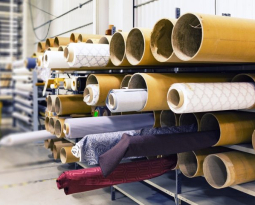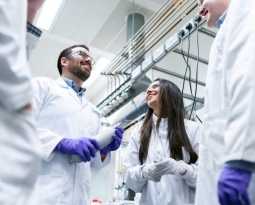Washington Patent of the Month – May 2023
Acucela Inc., a biotech subsidiary of Kubota Pharmaceutical Holdings Co, Ltd., has been at the forefront of developing innovative treatments for refractive errors of the eye, particularly myopia or near-sightedness. While conventional treatments like glasses, contact lenses, and refractive surgery can be effective, they do not address the underlying mechanisms of axial growth that result in myopia progression.
Acucela has developed a new approach to decrease myopia progression that can meet the expectations of young wearers while providing effective peripheral hyperopic defocus. The technology is packaged in a soft contact lens with peripheral micro-displays made of organic LEDs or micro-LEDS. This technology controls light and optics to form an image in front of the retina, in a region that comprises a resolution finer than the resolution of the retina at the region. Light is directed to the optical axis of the eye, adjusting the depth of focus to create a clear image.
The micro-lens arrays are optically designed to provide a finely resolved image in the peripheral retina while avoiding significant central aberrations that might otherwise compromise distance vision.
These novel approaches provide an effective treatment for myopia progression while also providing a high level of comfort and performance for young wearers. With continued research and development, Acucela may offer new solutions for refractive errors that can improve the quality of life for millions of people around the world.
Acucela is committed to translating innovation into a diverse portfolio of drugs and devices to preserve and restore vision for millions of people worldwide. Acucela’s development pipeline includes drug candidates and therapeutics for the treatment of retinitis pigmentosa, proliferative diabetic retinopathy, diabetic macular edema, AMD, Stargardt disease, cataract and presbyopia. The company is also developing a monitoring device for neovascular retinal diseases, to be used directly by patients.
Are you developing new technology for an existing application? Did you know your development work could be eligible for the R&D Tax Credit and you can receive up to 14% back on your expenses? Even if your development isn’t successful your work may still qualify for R&D credits (i.e. you don’t need to have a patent to qualify). To find out more, please contact a Swanson Reed R&D Specialist today or check out our free online eligibility test.
Who We Are:
Swanson Reed is one of the U.S.’ largest Specialist R&D tax advisory firms. We manage all facets of the R&D tax credit program, from claim preparation and audit compliance to claim disputes.
Swanson Reed regularly hosts free webinars and provides free IRS CE and CPE credits for CPAs. For more information please visit us at www.swansonreed.com/webinars or contact your usual Swanson Reed representative.

















